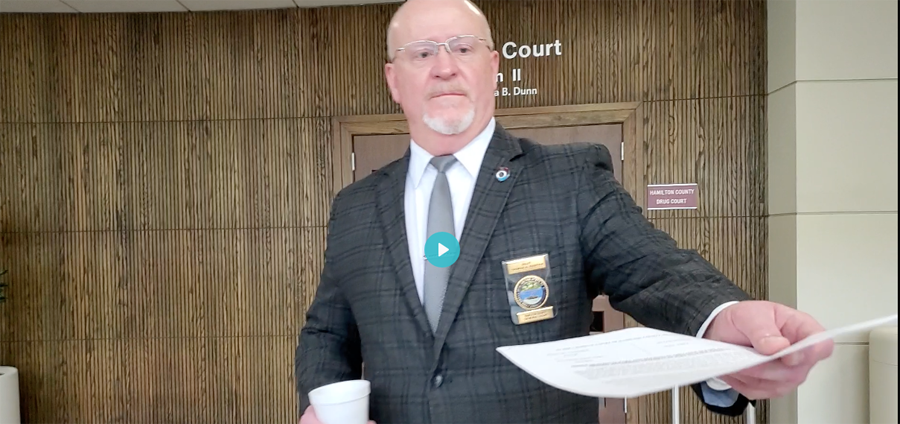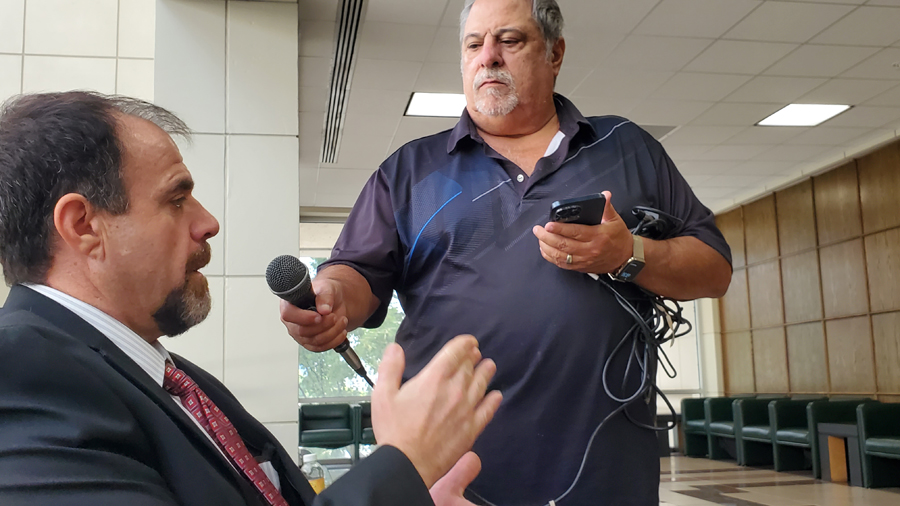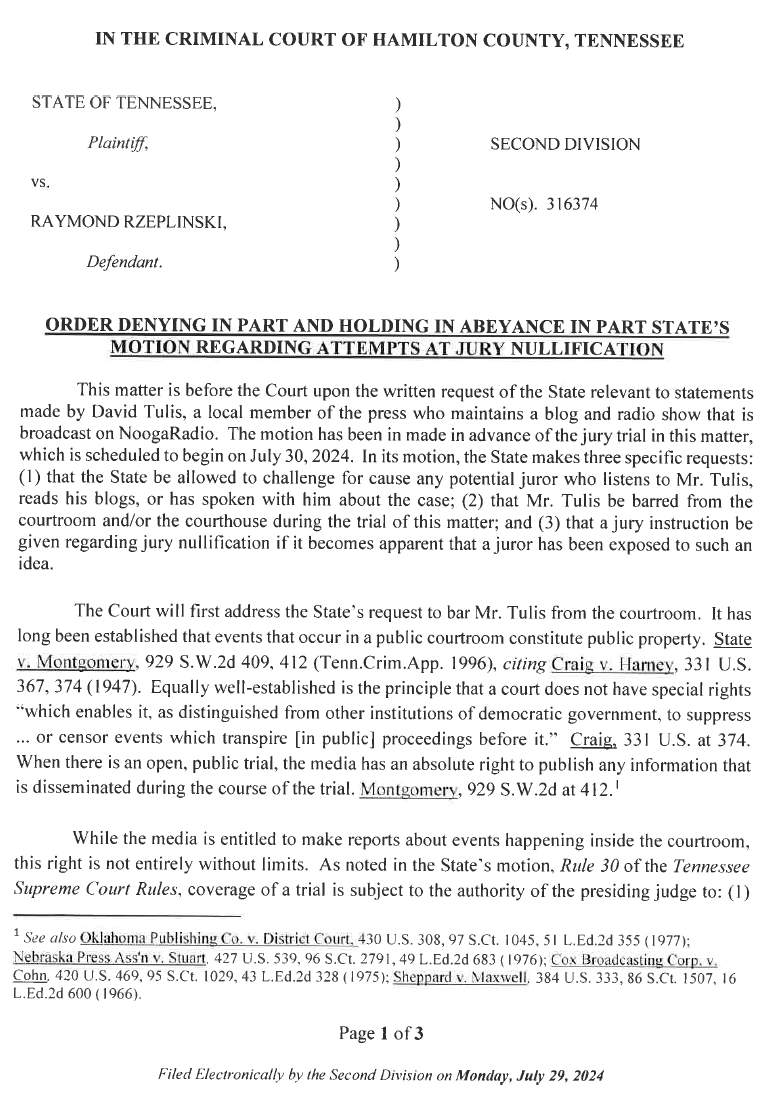
A court officer in Hamilton County, Tenn., hands me an order by criminal court Judge Amanda Dunn upholding the rights of the press and the open courts. (Photo David Tulis)

Ray Rzeplinski, left, gives an interview to Copperhead Radio’s Sab Cupelli. (Photo David Tulis)

Amanda Dunn, crimina court judge in Hamilton County, Tenn.f
CHATTANOOGA, Tenn., Monday, July 29, 2024 — A bailiff swings open the heavy door of courtroom and hands me a page order from criminal court judge Amanda Dunn upholding the rights of the press and the open court.
By David Tulis
The order denies the motion by the prosecutor in the “2A Ray” case to ban me from the courts building and coverage of his case.
My counterattack on her lawyer ethics and breach of both of office is held “in abeyance.”
The court says “It has long been established that events that occur in a public courtroom constitute public property. [citations omitted] Equally well-established is the principle that a court does not have special rights “which enables it, as distinguished from other institutions of democratic government, to suppress … or censor events which transpire [in public] proceedings before it.” [cite omitted] When there is an open, public trial, the media has an absolute right to publish any information that is disseminated during the course of the trial. [cite omitted] While the media is entitled to make reports about events happening inside the courtroom, this right is not entirely without limits. As noted in the State’s motion, Rule 30 of the Tennessee
Supreme Court Rules, coverage of a trial is subject to the authority of the presiding judge to: (l) control the conduct of the proceedings before the court; (2) maintain decorum and prevent distractions; (3) guarantee the safety of any party, witness, or juror, and (4) ensure the fair and impartial administration of justice in the pending case. In addition, media coverage is specifically prohibited as to both jury selection and the identities of jurors. [citation omitted] As the Court reads the multitudes of state and federal cases addressing the right of the media to be present in the courtroom, it is apparent that a prohibition on reporting what takes place inside a courtroom constitutes a prior restraint in violation of the First Amendment to the United States Constitution. Courtrooms must remain open to the media, even if the reporting may be biased or potentially unfair to one party or the other, in order to ensure that constitutional rights to a public trial and freedom of the process are honored.
She goes on to say the court “respectfully disagrees with the State that Mr. Tulis’s use of his media platforms to promote jury nullification in this case constitutes improper influence of a juror.”
She cites Tenn. Code Ann. 39-16-509(a) defining the offense of improper influence of a juror as privately communicating with a juror with the intent to influence the outcome of the proceedings on the basis of considerations other than those authorized by law.
“Mr. Tulis has appeared in the Second Division of Criminal Court on more than one occasion. To date, he has never disrupted a court proceeding and the Court expects he will continue to maintain decorum during the trial in question. As a member of the media, Mr. Tulis has a right to report the events of the trial, and therefore the Court declines to prevent him from attending trial in this case.”
She says if I or anyone else “personally speak with a potential juror or otherwise influence the jury panel in this case, the Court will issue an order to prevent further conduct, potentially including criminal contempt.”
Judge Dunn indicates that she will not allow my name to be flung before the jury as if it were a poison, and a bar to a reader or listener. Her order indicates she will allow general questions if the jury prospects have heard or read reporting on the case, and, if so, what, and will such reporting make them biased in the case.
In her suit against me, styled a motion in State v. Rzepinski, Miss Wamp asks that she be able to delete anyone who reads or listens. I have been on the air reporting 12 years, and blogging for 13 since leaving an employment at Chattanooga Times Free Press. She wants to be able to challenge such juror for cause without having to waste a peremptory challenge.

This page is the first of 3 in Judge Amanda Dunn’s order denying a motion by DA Coty Wamp to block my reporting on the Rzeplinski trial.
READ IT: Judge upholds press, open courts rights
“A juror [who] has been exposed to Mr. Tulis’s opinions regarding jury nullification is a juror that has been tainted by exposure to an unlawful doctrine, and unfairly prejudices them and makes them unacceptable as a juror,” Miss Wamp says “This is also not something that can be remedied solely through an instruction. ***If jurors have been exposed to this unlawful concept, it is a bell that cannot be unrung, and the state may only have one chance at trying its case.”
Ripe for nullification
The Ray Rzeplinski trial from which this controversy springs is a malicious prosecution on the part of Miss Wamp, initiated in the term of predecessor Neal Pinkston. It should not have been brought, because ‘2A Ray” has many evidences showing his felony record is “cured” and that it violates no law for him to possess firearms. Jury nullification is always a right of jurors to exercise, though rulings indicate it cannot be viewed as a right of the defendant.
Jury veto power is explained by midstate bureau chief Christopher Sapp.
You’re gonna try to put our peers on the chopping block? No, we have the absolute right to set that aside. We have the absolute right to tell you to go get back into your little corner, to smack your fingers, by letting him go.
People can set aside the law. They can excuse him. They can pardon him. The people alone – that’s what they’re doing. They’re exercising their executive power. The governor has delegated power. Where do those delegations come from? Those delegations come from the people. So when the jury sits they are the lawmaker – the law giver. They are the executive. And they are the judge. So, if they exercise their right of nullification, they are sitting as all three branches of government at one time to determine the law, to lay the law, to pardon if they choose.


“It came to the attention of the State of Tennessee that…”
What facts, admitted into the record, evidence that Coty represents the State of Tennessee?
Factually, what is the State of Tennessee? Aand how does the State seize authority over Ray?
Is Ray a slave?
https://www.law.cornell.edu/constitution-conan/amendment-13/section-1-2/peonage